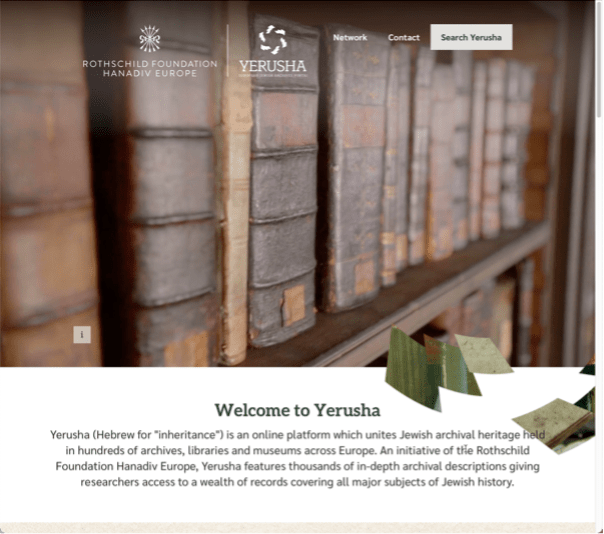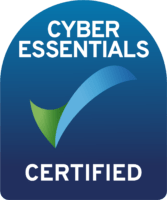… the research process was just the beginning of the journey to create a leading resource of content for expert researchers to access.

“Yerusha” (Hebrew for “inheritance”) is an online platform which unites information about Jewish archival heritage held in hundreds of archives, libraries and museums across Europe.
Introduction
The Rothschild Foundation Hanadiv Europe (RFHE) is a charitable foundation with the mission of “strengthening Jewish communal life and ensuring cultural heritage is accessible for future generations”.
One of RFHEs key projects is Yerusha, which is working to unite collection level descriptions of Jewish archival holdings from across Europe. The Yerusha project has been working with a network of researchers across Europe to create collection level records of appropriate material from over 550 holding institutions in 28 countries. At the time of launch there will be more than 12,000 collection level descriptions available for researchers online.
Scan Data Experts (SDE) were brought into the project to devise and implement a process to gather and standardise the collection level descriptions and to make them available online.
The Story of Yerusha
“Yerusha” (Hebrew for “inheritance”) is an online platform which unites information about Jewish archival heritage held in hundreds of archives, libraries and museums across Europe. An initiative of the Rothschild Foundation Hanadiv Europe, Yerusha features thousands of in-depth archival descriptions giving researchers access to a wealth of records covering all major subjects of Jewish history.”1
1 Rothschild Foundation Hanadiv Europe (2022). Welcome to Yerusha. [online] Yerusha. Available at: https://yerusha.eu [Accessed 31 Mar. 2022].
“Yerusha is a collaborative effort of European, US and Israeli academic and heritage institutions. Jewish museums and libraries, state archives, higher education departments and research centres have joined forces to create a central platform providing detailed information on centuries of European Jewish archival heritage.”2
2 Rothschild Foundation Hanadiv Europe (2022). Network. [online] Yerusha. Available at: https://yerusha.eu [Accessed 31 Mar. 2022].
The Yerusha project has undertaken the task of exploring archives and other holding institutions across 28 countries to gather information about collections featuring Jewish history. The project has also ingested collection level descriptions from other archive aggregators such as the AIM25 network in London. The data will all be available online when the database launches in 2022.
The project challenges
When SDE first became involved with the project it was clear that the information gathering phase had been well planned and underway for some time. The project had created a metadata schema for the collection level descriptions based on the ISAD(G) cataloguing rules and including access point fields for Persons/families, locations and subject terms featured in the collections.
All the primary data was captured in an Excel format by local researchers, and this data was then manually edited. The advantage of the excel approach was that it required a low level of technical ability to use the software and enter the data. The disadvantage being that validation of the data was impossible. The main challenge was that the project needed a procedure to validate and enhance the collection level records before making them available.
At that time also the project was investigating different options for making the content available online. After publication, the project wanted users to be able to search fluidly through the records and browse using a map of the featured locations. They also required the records to be enhanced with authority file data so that the content could be found using other name forms for locations, persons, families, and subject terms. In short, the research process was just the beginning of the journey to create a leading resource of content for expert researchers to access.
Why RFHE Chose Scan Data Experts
In the early stages of the project the foundation approached SDE after hearing about the work that had been carried out for the Wiener Holocaust Library working on their digital transformation strategy.
How Scan Data Experts Responded
SDE were invited to discuss the project and propose an approach for managing the data validation and enhancement process and for publishing the resource online. After a period of research and information gathering, it became clear that the most effective approach would be to use the Goobi suite of tools from intranda.
SDE wrote a detailed specification and proposal for the foundation which also enabled the Intranda team to provide a proposal for the provision of the Goobi Workflow and Goobi Viewer systems.
SDE and intranda were then contracted to assist with the project. SDE was assigned the role of specialist advisor and IT project manager and Intranda were responsible for ensuring that the systems were installed and functioning correctly. SDE also managed the data input, training of the team and managing bulk changes to the data throughout the project.
The Goobi workflow system was set up to allow the importing and validation of the excel files containing collection level descriptions. The validation was an important step because it allowed the project director to quickly assess whether an upload file had large areas of incomplete data in it and therefore if it should be returned to the source for completion before uploading.
There was a requirement to link certain fields in the records (persons/families, locations and subject terms) to controlled vocabularies to make searching easier. This was facilitated by a development to the Goobi vocabulary management tool. This tool allows for several internal vocabularies to be created in the system as ‘look ups’ to place validated authority file data in the records which are published online.
In parallel to this work SDE project managed the development of the online Yerusha platform using the Goobi Viewer system. The system was configured to allow for the display of the records, browsing by locations, languages, holding institutions, subject terms, countries etc. A map interface was included to enable users to navigate the map to find collection descriptions that feature at a particular location. The viewer was also redesigned in line with the Yerusha branding.
The Results
The SDE team has led the technical aspects of the project and the software development, expertly carried out by intranda, has enabled some real innovation to be applied to the project. The project is planning to launch in 2022 and it will provide the most comprehensive resource about Jewish archive collections online for expert researchers and casual browsers alike.
Want to find out more?
If you would like to hear more about the project and how SDE was able to help, then please get in touch with us here.
We have a variety of case studies available to show how we have designed and implemented a large range of different heritage digitisation and digital strategy projects for our customers. Please feel free to browse through them here.
If you are facing similar challenges or are considering projects like the one described here, then get in touch. We would be happy to talk through your plans on an informal basis to see if we can point you in the right direction. Having an initial consultation is free and comes with no obligation. We look forward to hearing from you.





